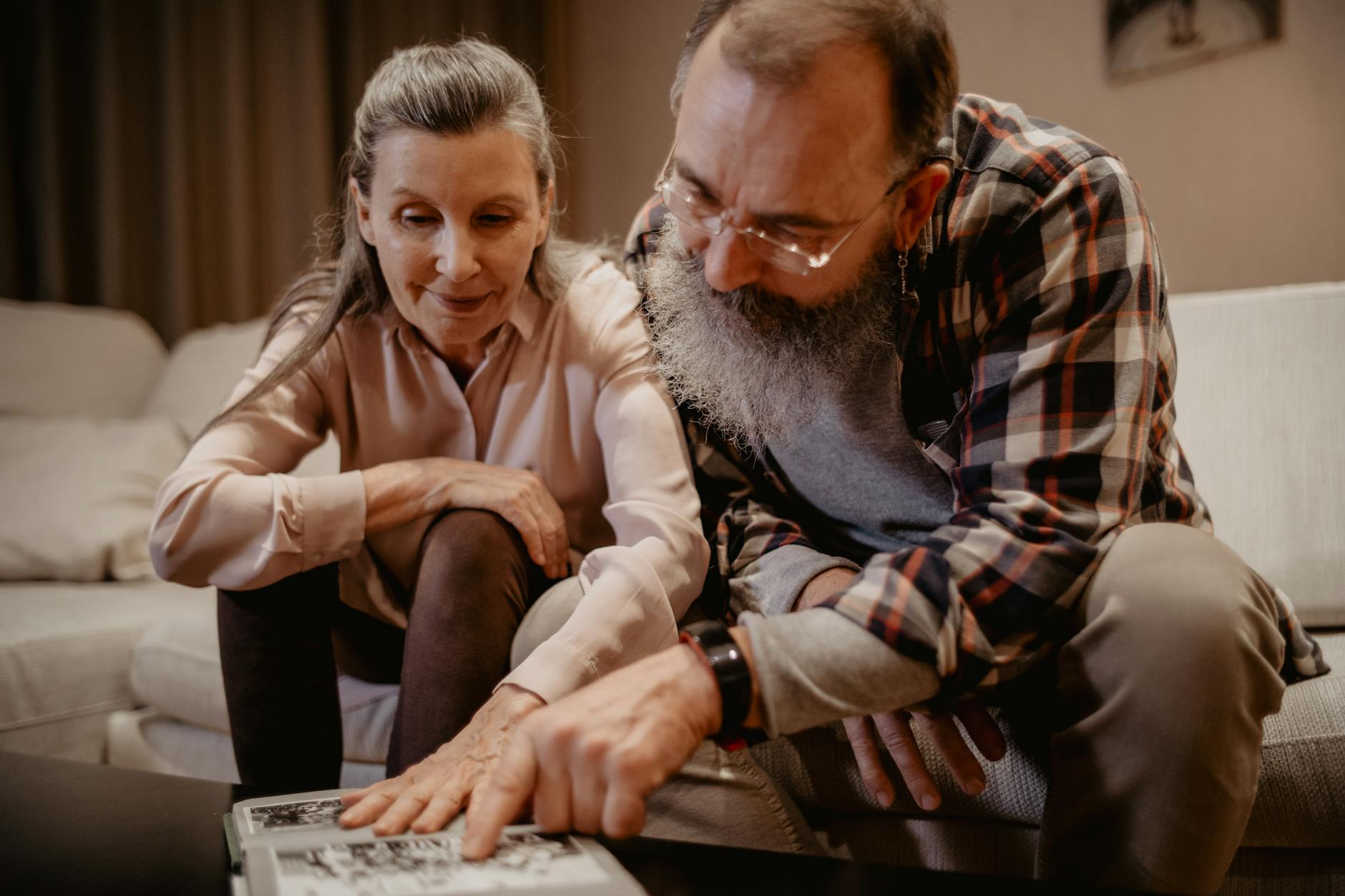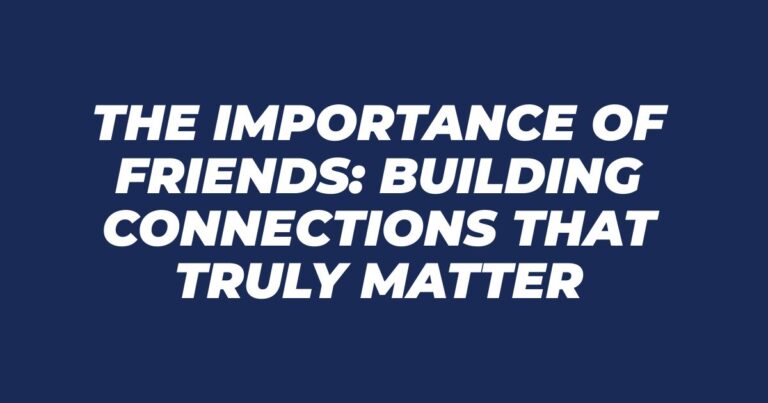The importance of friends cannot be overstated. Friendship has been a cornerstone of human civilization, growing from survival-based bonds in ancient societies to deep, emotional connections in the modern world. The importance of friends extends beyond companionship—it plays a key role in trust, personal growth, and happiness. In our unpredictable world, friendships provide support during hardships and amplify life’s joys.Friendship has been a cornerstone of human civilization, evolving from the strong, survival-based bonds of ancient societies to deep, emotional connections that define our modern lives. The importance of friends isn’t just about having companions; it extends to trust, personal growth, and our overall happiness. In today’s fast-paced world, friendships are anchors, offering support in times of uncertainty and amplifying the joys of life. But ask yourself—“Is friendship a relationship you can trust your life to?” Exploring its impact might just shift your perspective. For deeper insights into meaningful connections.
Table of Contents
Toggle
Photo by Ivan Samkov
History and Evolution of Friendship
Friendship has supported human societies for centuries, evolving alongside our needs, cultures, and technologies. From survival-driven alliances to deep emotional connections founded on mutual trust, the importance of friends has remained unwavering. This section takes a closer look at how friendship has developed over time.
The Early Roots of Friendship
For early humans, friendship wasn’t just about companionship—it was vital to survival. Throughout history, humans have banded together to protect themselves, share resources, and build communities. These relationships laid the foundation for the alliances we now know as friendship.
In ancient Greece and Rome, friendships were more structured but equally essential. Philosophers like Aristotle saw friendship as a cornerstone of moral life. He categorized friendships into three types: those of utility, pleasure, and virtue—the latter being the strongest. Roman statesmen, such as Cicero, also emphasized the role of friendship in creating trustworthy political and personal bonds.
When comparing these traditional ties with modern relationships, one can notice a shift. Back then, these connections often required physical presence and intimate trust. Today, our bonds span continents through texts, calls, and virtual interactions. However, though the medium has changed, the importance of friends remains as critical as it was in ancient times. For further insight into how friendships have shaped human culture, learn more here.

Photo by Mikhail Nilov
The Modern Concept of Friendship
Technology and evolving societal norms have fundamentally altered how we define and maintain friendships. The advent of social media platforms and instant messaging blurred the boundaries between acquaintances and true friends. Friendships that once thrived during face-to-face chats now often exist as digital notifications. This transition has reshaped what connection really means.
Moreover, friendships now adapt to different stages of life. During childhood, bonds are defined by shared activities; for adults, careers, families, and responsibilities influence how these connections are nurtured. As we age, the value placed on deep, meaningful friendships often grows. Studies even suggest these relationships may affect our physical and emotional well-being. You can explore the scientific perspectives on the evolutionary origins of human friendship.
Through all these changes, one thing stays constant: the importance of friends in enhancing our quality of life. Whether we reconnect virtually or hold on to lifelong friendships, these bonds reflect the essence of humanity—understanding, giving, and receiving love.

Photo by Andrea Piacquadio
Exploring the Depth of Friendship
Friendship is more than casual conversations or shared hobbies. At its core, it’s about genuine connections that shape our lives in profound ways. The importance of friends goes beyond companionship; it’s a cornerstone of emotional and mental well-being. Let’s delve deeper into what defines true friendship and explore its most critical aspects.
Defining Friendship: Characteristics of a Healthy Bond
A true friendship is not defined solely by time spent together but by the quality of the connection. What makes someone a good friend? Here are some key traits to consider:
- Honesty: True friends offer sincere advice and don’t shy away from being truthful, even if it’s uncomfortable.
- Trustworthiness: Sharing personal stories and secrets requires a foundation of trust, which sets good friends apart.
- Supportive Nature: Reliable friends stick by your side, whether you’re celebrating or going through tough times.
It’s essential to distinguish between various levels of relationships. While acquaintances might share surface-level interactions, friendships delve deeper, offering emotional closeness and mutual respect. For instance:
- Acquaintances: Casual connections, such as co-workers, neighbors, or online followers.
- Situational Friends: These relationships often form in specific settings, such as school or work, and may fade away when circumstances change.
- Lifelong Friends: These bonds stand the test of time, offering unwavering support no matter what.
Understanding these layers helps us better appreciate the importance of friends in creating fulfilling relationships. For more insight into building lasting connections, you can explore The Science of Why Friendships Keep Us Healthy.
Friendship stands out during life’s challenges. Whether it’s helping you overcome emotional struggles or lending practical support, true friends are anchors.

Photo by Kamaji Ogino
Quality Friendships and Their Impact on Life
Friendship is put to the ultimate test when life throws challenges our way. Whether it’s emotional struggles or physical obstacles, friends are the ones we often lean on. True friends act as anchors, helping us navigate storms with strength and resilience.
Imagine a friend who stood by you during a personal crisis or supported you in ways you never expected. Stories of loyalty remind us of what makes these bonds so special. For example:
- A friend defending you in unexpected situations where your ability to advocate for yourself was limited.
- Friends helping one another recover from health challenges or financial setbacks.
Such acts of loyalty capture the essence of genuine friendship. Research even suggests that these reliable connections contribute to improved mental health and lower stress levels. To understand these benefits in greater detail, check out Friendships: Enrich Your Life and Improve Your Health.
While trust in friendships can evolve over time, its roots lie in consistency, shared values, and mutual respect. Knowing you have someone who will stand by you, no matter what, exemplifies the importance of friends in our lives.
Healthy friendships are invaluable, offering emotional safety and the reassurance that we’re not alone in this journey.
Shared Activities That Strengthen Bonds
Quality friendships aren’t just about having a good time—they’re critical for mental, emotional, and even physical health. Research consistently shows that meaningful connections improve longevity, reduce stress, and enhance overall well-being. According to the Mayo Clinic, friendships can boost happiness, lower stress levels, and even strengthen the immune system.
In particular, studies highlight how friendship networks can reduce feelings of loneliness and depression. For example, psychological research from the American Psychological Association attributes healthy friendships to greater life satisfaction and mental stability. Think about it: when life gets tough, who steps up to remind you you’re not alone? True friends do.
From casual chats to shared challenges, the importance of friends shines in every aspect of our lives. These relationships are more than just social—they’re core to staying healthy and navigating life’s ups and downs.

Photo by Ketut Subiyanto
The Role of Younger Acquaintances
Mentoring and supporting younger individuals opens avenues for mutual growth. These connections may take the form of guiding a younger colleague or simply being a role model. By investing time and wisdom into these relationships, we create a ripple effect of positivity.
But it’s not just about giving. Younger acquaintances bring fresh perspectives that can enrich your life as well. They challenge norms, share modern approaches, and, without realizing it, keep you young at heart. This mutual exchange is a powerful reminder of the importance of friends, regardless of age.
If we step back and think, mentoring can feel like planting seeds. Over time, those seeds grow into strong trees—offering shade, support, and even a few surprises.
Social and Emotional Impacts of Friendship
How Friendship Strengthens Communities
Friendship is more than just having a circle of people you hang out with—it’s a cornerstone of emotional and social well-being. The importance of friends goes beyond shared memories and into how they impact our emotions, growth, and resilience. Whether you’re forming lifelong bonds or navigating the complexities of adult relationships, friendships play a critical role in shaping who we are.

Photo by Pavel Danilyuk
Emotional Resilience Through Friends
Friendships are vital for fostering emotional intelligence, improving communication, and building resilience. Having a friend who listens without judgment is invaluable when processing emotions or discussing life’s challenges. Friends can serve as sounding boards, giving us the chance to sort out our thoughts and feelings in a safe, supportive environment.
On the flip side, the loss of a friendship can be emotionally taxing, but it also teaches us valuable lessons about moving forward. Whether it’s a high school best friend or a colleague who became your confidant, every friendship shapes your ability to empathize and connect. For more insights on the emotional benefits of friendships, check out The Science of Why Friendships Keep Us Healthy.
Current Trends and Challenges in Friendships
The friends you make during college often feel like family. You share milestones, late-night study sessions, and personal growth. However, adult friendships come with their unique set of challenges and rewards. Unlike college, where convenience often facilitates connections, adult life demands intentionality. Between work responsibilities, family commitments, and life changes, it’s easy to lose touch.
To maintain adult friendships:
- Schedule Time Together: Set regular catch-ups over coffee or make use of technology like video calls.
- Prioritize Communication: A quick text or call can keep the connection alive.
- Embrace Life Stages: Accept that priorities shift, but common ground can always be found.
If you want to explore how these friendships change further, Friendships and Social Connections (Part 1): Benefits offers helpful perspective.
Connecting Virtually
Technology helps maintain long-distance friendships, but virtual bonds demand constant effort to hold meaning over time. Genuine emotional investment still remains key.

Photo by Katrin Bolovtsova
Lifelong Benefits of Building Strong Friendships
Friendship is not just a casual bond; it is a relationship that defines the core of human intimacy and connection. The importance of friends extends far beyond occasional fun or shared hobbies. Cultivating and nurturing these connections brings lifelong growth, impacts society positively, and provides invaluable emotional and practical support.
Personal Growth
Strong friendships act as catalysts for personal transformation. From providing unwavering encouragement to sharing life-changing advice, true friends often inspire us to become better versions of ourselves. For instance, think about those moments when a friend’s words shifted your perspective or gave you the courage to take a bold step in life.
Consider the example of a student once too shy to speak in class but, with the persistent encouragement of a friend, eventually found confidence and excelled in public speaking. Through shared experiences and mutual growth, friendships challenge our comfort zones while offering a reliable support system.
Moreover, lifelong friends keep us grounded by reminding us of our past while celebrating our achievements. These bonds, steeped in authenticity, continually affirm the importance of friends in helping us grow and thrive.
For further insights into how friendships foster growth and well-being, explore scientifically-backed benefits here.
Positive Community Impact
Friendships ripple out beyond individual lives to create a positive societal impact. History is full of examples of friends who joined forces to change the world for the better. From fostering grassroots initiatives to supporting marginalized communities, friendships often lead to extraordinary contributions.
At a more personal level, teaching younger generations the value of meaningful relationships is perhaps the most enduring societal gift. When children and teens learn the importance of friends, they carry these lessons into adulthood, fostering stronger and more compassionate communities.
Consider organizing community events with friends, like planting trees or volunteering at shelters. Such actions not only bring positive change but also deepen relationships. To understand the broader impact of friendship on health and society, check out this compelling read on lifelong friendships.
The Joy of Growing Together
Supportive friends cheer you on through failures and proudly celebrate your successes. These bonds nurture self-confidence and provide a foundation for personal development.

Photo by Alina K.
Emotional Comfort and Practical Support
It’s no secret that true friendships are havens of emotional and practical support. Friends lend a listening ear during difficult times and stand by us unconditionally. They cheer us on in moments of triumph and pull us back from the brink in moments of despair.
- Emotional Comfort: A coffee date with a friend can alleviate a week’s worth of stress. Sharing your ups and downs with someone who understands you lightens the emotional burden significantly.
- Practical Assistance: Whether it’s career advice, help with deciding on childcare arrangements, or sharing financial know-how, friends often act as unpaid consultants, offering supportive guidance with no strings attached.
These benefits span across every stage of life. During our career years, friendships often lead to networking opportunities or professional growth. In later years, they provide companionship and combat isolation. Friendships aren’t just for leisure—they’re indispensable for a balanced life. For more on how friendships enrich health, take a look at this article about strong ties and well-being.
These examples illustrate why the importance of friends cannot be overstated. As we nurture these bonds, we build a foundation for a deeply fulfilling life, both individually and collectively.
FAQs on Friendship
Friendship plays an integral role in shaping who we are, emotionally and socially. Understanding its layers, nuances, and complexities can help us better appreciate the importance of friends. Here are some frequently asked questions about friendships, tailored to clear up doubts and offer insights.
01. Why Are Friends So Important in Life?
Friends are the cornerstone of our happiness and emotional well-being. They provide support during difficult times, celebrate our successes, and share life’s everyday moments. Studies highlight that meaningful friendships can improve mental health, enhance longevity, and even boost physical health. For example, meaningful connections have been linked to stronger immune systems, increased happiness, and lower stress levels. You can learn more about how friendships improve overall health by checking out this comprehensive guide on the importance of friendship.
02. How Do Friendships Change as We Age?
Friendships evolve with life stages. During childhood, they revolve around play and shared activities, while in adulthood, they often focus on shared responsibilities, emotional support, and mutual growth. As people grow older, they value depth over quantity in friendships. Aging doesn’t diminish the importance of friends, but it shapes the type of connections we seek. For a deeper dive into the shifts in friendships over time, explore the science of friendships and their impact.
03. What Are the Signs of a Healthy Friendship?
A healthy friendship is characterized by mutual respect, trust, and open communication. If your friendship inspires you, challenges you positively, and offers a safe space for vulnerabilities, you’ve got a keeper. Look for these traits in your friendships:
- Honesty: Your friend is upfront and genuine.
- Reliability: They’re dependable and keep their word.
- Empathy: They understand and share in your emotions.
For more actionable tips on fostering healthy friendships, you might find this resource on building emotional connections in friendships enlightening.
04. How Can You Make New Friends as an Adult?
Building friendships as an adult can feel daunting, but it’s entirely possible. Here’s how:
- Join Groups or Classes: Shared interests build solid foundations for friendships.
- Be Open to Conversations: A casual intro can lead to something meaningful if nurtured.
- Volunteer or Network: New settings naturally introduce new people.
The key is consistency and genuine effort. Adult friendships may take time, but they’re worth the patience. For additional tips on creating meaningful connections, try exploring ways to stay connected and form friendships as an adult.
05. Why Do Some Friendships End?
Friendships may fade or end due to life changes, misunderstandings, or conflicting values. While it’s natural to outgrow some relationships, it’s essential to handle these situations with grace and understanding. Letting go doesn’t diminish the importance of friends; it simply reflects the evolving nature of human connections.
Being mindful of your values often helps in recognizing when it’s time to let go. For strategies on navigating challenging friendships, consider exploring posts about managing difficulties in relationships.
By asking and answering these questions, we can deepen our understanding of friendships and continue celebrating their unique role in shaping our lives.
Conclusion
Friendships are the cornerstone of human happiness. They shape our experiences, uplift our spirits, and provide stability in even the most uncertain times. The importance of friends goes beyond mere companionship—these connections are essential for personal growth, emotional resilience, and mental well-being. Each chapter of life offers new opportunities to nurture and cherish these bonds, reinforcing their irreplaceable role in our lives.
For insights about forming deeper connections and becoming a better support system yourself, explore Proven Steps To Unlock the Art of Being a People Person. Truly understanding the value of friendship can transform not only your relationships but also your outlook on life itself.
Related posts:
 How Friendships Enrich Your Life and Strengthen Powerful Connections: 2025
How Friendships Enrich Your Life and Strengthen Powerful Connections: 2025
 People Person: 10 Proven Steps to Master the Art of Connection in 2025
People Person: 10 Proven Steps to Master the Art of Connection in 2025
 Why Couples Fight Over Small Things and How to Fix It
Why Couples Fight Over Small Things and How to Fix It
 Explore Your Inner Potential: Mastering Self-Regulation Skills for Empowerment and Morning Magic| 5 Steps
Explore Your Inner Potential: Mastering Self-Regulation Skills for Empowerment and Morning Magic| 5 Steps





